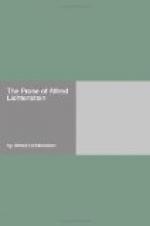Kohn receded into his hump. Destroyed, he moved on. Tears smeared his face. He felt her sadly gazing at his back. Then he ran around the corner of the next group of houses, stopped, dried his eyes with a handkerchief, and hurried off, still weeping.
Like a sickness, a slimy fog crept into the city, as it grew blind. Street lights were gloomy swamp flowers, which flickered on blackish, glowing stalks. Objects and creatures had only chilly shadows and blurred movements. Like a monster, a night bus reeled past Kohn. The poet called out: “Now one is again entirely alone.” Then he encountered a fat, hunch-backed woman, with long spidery legs, wearing a ghostly, diaphanous skirt. Her upper body resembled a ball lying on a high little table. She looked at him temptingly and sympathetically, with an amorous smile, which the fog contorted into an insane expression. Kohn disappeared immediately in the greyness. She groaned and then trundeled on.
Sluggishly day limped closer, smashing the remains of the night with an iron crutch. The half-extinguished Cafe Kloesschen, a gleaming fragment, lay still in the soundless morning. In the background sat the last customer. Kuno Kohn had let his head sink back on his trembling hump. The scrawny fingers of his hand covered his forehead and face. His whole body cried out noiselessly.
The Virgin
Maria Mondmilch was the only child of the art-historian Doctor Maximilian Mondmilch and his lovely wife Marga Mondmilch. Mrs. Mondmilch is said to have been at one time a scullery-maid in the cafe in which Mr. Mondmilch—who at the time was a student—drank tea, read newspapers, and smoked. After the birth of the child she had secretly left her spouse, supposedly to spend a few weeks with a champagne-waiter. Thereafter she fooled around alternately with very different men from very different social classes. She returned when she learned that the incurable Doctor had been brought to a mental institution for diseases of the brain. She carefully looked after the mortally ill man for the short time before he died. Then she married a wonderful coachman, who idolized her.
Doctor Mondmilch’s illnes was first discovered when he wanted to commit a criminal offense against his eight-year old daughter. Fortunately the atrocity was able to be prevented at the last moment. The child, frightened in heart and mind, was placed in the care of the madman’s brother, the excellent Moriz von Mondmilch, a first-class administrative officer. The last word of the dying art-historian was, “Maria.”
A curious affection developed between the uncle and the niece. Nothing happened that could have been construed as illegal. The passion between the child and the old man aroused the jealousy of old Mrs. Minna von Mondmilch. After the marital discord had become too burdensome, the angered civil servant felt compelled to agree one year later to a separation from his ward. He also had to consider his daughter, who had become a young woman. The parting was hard. His Excellency Moriz von Mondmilch had a crying fit.




